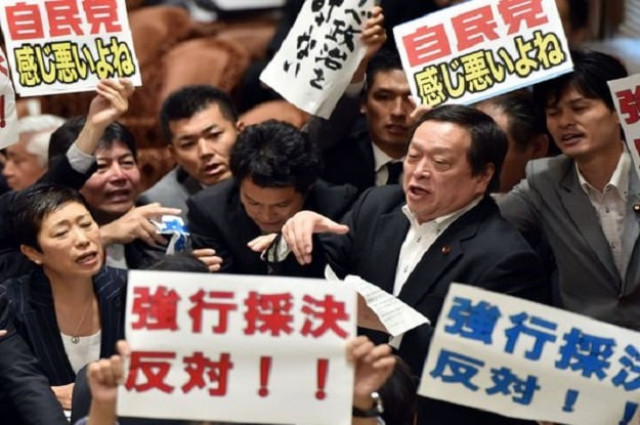Military role: Defence bill sparks uproar in Japan parliament
The proposal is expected to go to lower chamber for voting today

The proposal is expected to go to lower chamber for voting today. PHOTO: AFP
Dozens of politicians held signs protesting against what they said was the "forced" passage of legislation that will bolster the role of Japan's military, in a way they say is anathema to the country's pacifist constitution.
The floor of the committee room filled moments after chairman Yasukazu Hamada, a member of Abe's conservative Liberal Democratic Party (LDP), called a vote.
Lawmakers chanted "nay, nay, nay" and held posters saying "No to Abe politics", and "No to a forced decision", as their LDP colleagues pressed on with the vote, which they won comfortably.
"This will drastically change our defence policies. It's also likely they are unconstitutional," said Katsuya Okada, head of main opposition Democratic Party of Japan (DPJ). "I strongly protest that these bills were forced through the committee."
The bills, which are expected to go to a vote of the powerful – and LDP-dominated – lower chamber on Thursday, are something of a pet project for Abe, despite widespread public disquiet over what many Japanese say is an affront to 70 years of pacifism.
Hundreds of people protested outside parliament on Wednesday. On Tuesday, around 20,000 people rallied against the changes.
Abe, a robust nationalist, has pushed for what he calls a normalisation of Japan's military posture. He has sought to loosen restrictions that have bound the so-called Self-Defence Forces to a narrowly defensive role for decades.
Published in The Express Tribune, July 16th, 2015.



















COMMENTS
Comments are moderated and generally will be posted if they are on-topic and not abusive.
For more information, please see our Comments FAQ